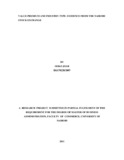| dc.description.abstract | Investors will always want to invest in projects than can guarantee higher returns than
others, holding risk constant. They therefore tend to employ strategies that will contribute
to the realization of higher returns. One of the most frequently used strategies is value
investing where investors purchase value stocks rather than growth stocks in order to be
benefit from potential long term performance of value stocks in the form of superior
average returns. In finance, the word value premium refers to the excess return expected
as a result of investing in value stocks as opposed to growth stocks.
This study sought to find out whether there exists a value premium at the NSE when
stocks are sorted on the basis of book to market value, and whether industry type plays a
role in value premium. It’s indicative from the study that value stocks outperformed
growth stocks for the period under study. This is consistent with other studies done in
Kenya. Muhoro (2004) tested a value premium of 0.64 for the period 1999-2002 at the
NSE and Ngigi (2006) also tested the existence of value premium at the NSE.
The result of the test in this study, conducted at 0.05 confidence level is that there exist
value premium at the NSE. When stocks are grouped according to industries, there still
exists value premium. Industrial and allied sector have the highest value premium of
4.125 while agricultural sector have the lowest value premium of -1.162. Therefore for a
value strategist at the NSE, industrial and allied sector stocks are the best to invest in
while agricultural sector stocks are the worst to invest in. The findings are also consistent
with findings from similar studies in other markets in the world. Previous studies show
that for 60 plus years value has outperformed growth. The conclusion of this study is that
there exists a value premium at the N.S.E when stocks are sorted on the basis of B/M
ratio . However there exists no significant difference in value premium across
industries. This implies industry type is not a significant determinant of value premium | en_US |

